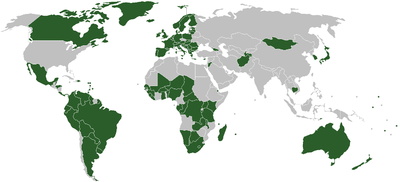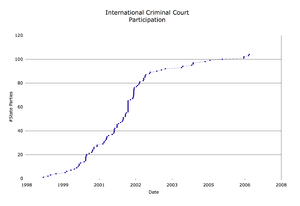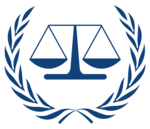الدول الموقعة على ميثاق روما للمحكمة الجنائية الدولية
الدول الموقعة على ميثاق روما للمحكمة الجنائية الدولية هي تلك الدول التي أقرت أو وافقت على ميثاق روما, المعاهدة المؤسـِسة للمحكمة الجنائية الدولية. وحتى يوليو 2008, فهناك 106 دولة عضوة في المحكمة;[1] سورينام و جزر كوك سيصبحوا دولاً أعضاءً في 1 اكتوبر 2008, ليرتفع الإجمالي إلى 108.[2] وهناك 40 دولة أخرى وقـَّعت ولكن تقر مجالسها التشريعية المعاهدة بعد, وهناك كذلك العديد من الدول التي لم توقع المعاهدة إلا أنها ألمحت بنيتها في الموافقة عليها.
وتستطيع المحكمة تلقائياً ممارسة سلطة قضائية على الجرائم المرتكبة في أراضي أي دولة عضو أو المرتكبة من أشخاص ينتمون لأي دولة عضو. الدول الأعضاء يجي أن تتعاون مع المحكمة, بما في ذلك تسليم المشتبه فيهم عندما تطلب المحكمة منهم ذلك.
وللدول الموقعة الحق في المشاركة في، والتصويت على، اجراءات جمعية الدول الأعضاء, التي هي الهيئة الحاكمة للمحكمة.
الدول الأعضاء
حتى يوليو 2008, الدول ال 108 التالية قرت شرَّعت أو وافقت على ميثاق روما:[2][3][4]
- في اوروبا: ألبانيا, أندورا, النمسا, بلجيكا, البوسنة والهرسك, بلغاريا, كرواتيا, قبرص, الدنمارك, إستونيا, فنلندا, فرنسا, جورجيا, ألمانيا, اليونان, المجر, أيسلندا, أيرلندا, إيطاليا, لاتڤيا, ليختنشتاين, ليثوانيا, لوكسمبورگ, مقدونيا, مالطة, الجبل الأسود, هولندا, النرويج, پولندا, البرتغال, رومانيا, سان مارينو, صربيا, سلوڤاكيا, سلوڤنيا, اسبانيا, السويد, سويسرا, المملكة المتحدة
- في أفريقيا: بنين, بوتسوانا, بوركينا فاسو, بوروندي, جمهورية أفريقيا الوسطى, تشاد, الكونغو, جمهورية الكونغو الديمقراطية, جزر القمر, جيبوتي, گابون, گامبيا, غانا, غينيا, كنيا, ليسوتو, ليبريا, مدغشقر, مالاوي, مالي, موريشيوس, ناميبيا, النيجر, نيجريا, السنغال, سييرا ليونه, جنوب أفريقيا, تنزانيا, اوغندا, زامبيا.
- في الأمريكتين: أنتيگا وبربودا, الأرجنتين, بربادوس, بليز, بوليڤيا, البرازيل, كندا, كولومبيا, كوستا ريكا, دومينيكا, جمهورية الدومينيكان, الإكوادور, گويانا, هندوراس, المكسيك, پنما, پاراگواي, پيرو, Saint Kitts and Nevis, Saint Vincent and the Grenadines, سورينام, ترينيداد وتوباگو, اوروگواي, ڤنزويلا
- في الاوقيانوسية: أستراليا, تيمور الشرقية, فيجي, جزر مارشال, ناورو, نيوزيلندا, ساموا
ميثاق روما سيصبح له قوة القانون في في سورينام وجزر كوك في 1 اكتوبر 2008; حتى ذلك الحين, فهناك 106 دولة عضو.
التشريع المـُـقـِـرّ
ميثاق روما يجبر الدول الأعضاء على التعاون مع المحكمة في التحقيقات والملاحقة القضائية للجرائم, ومن ذلك إلقاء القبض على المتهمين وتسليمهم.[5] الجزء 9 من الميثاق يتطلب من كل الدول الأعضاء أن “تتأكد من وجود اجراءات متوافرة في قوانينهم الوطنية لكل أنواع التعاون المنصوص عليها في هذا الجزء”.[6]
حسب مبدأ التكامل Complementarity في ميثاق روما, فالدول الأعضاء ملزمة بإنجاز تشريع وطني يـُشرِّع التحقيقات والملاحقات فب الجرائم الواقعة في اختصاص المحكمة.[بحاجة لمصدر]
حتى أبريل 2006, الدول التالية قد فعـَّلت أو أنشأت مسودة لتشريع:[7]
| الدول | تشريع الانضمام | تشريع التكامل Complementarity |
|---|---|---|
| أستراليا, بلجيكا, البوسنة والهرسك, بلغاريا, Canada, كرواتيا, دنمارك, إستونيا, فنلندا, جورجيا, ألمانيا, Iceland, Liechtenstein, ليثوانيا, مالطة, هولندا, نيوزيلندا, سلوڤاكيا, جنوب أفريقيا, اسبانيا, ترينيداد وتوباگو, المملكة المتحدة | تم تشريعه | تم تشريعه |
| كولومبيا, جمهورية الكونغو, صربيا, الجبل الأسود | تم تشريعه | مسودة |
| بوروندي, Costa Rica, مالي, النيجر, البرتغال | تم تشريعه | لا شيء |
| فرنسا, Norway, Peru, Poland, سلوڤنيا, السويد, سويسرا | مسودة | تم تشريعه |
| النمسا, اليابان, لاتڤيا, رومانيا | لا شيء | تم تشريعه |
| Argentina, Benin, Bolivia, Botswana, Brazil, Central African Republic, Democratic Republic of Congo, Dominica, Gabon, Ghana, Greece, Ireland, Italy, Kenya, Lesotho, Luxembourg, Nigeria, Samoa, Senegal, Uganda, Uruguay, Zambia | Draft | مسودة |
| جمهورية الدومينيكان, الإكوادور, هندوراس, المجر, الأردن, پنما, ڤنزويلا | مسودة | لا شيء |
| المكسيك | لا شيء | مسودة |
| Afghanistan, Albania, Andorra, Antigua and Barbuda, Barbados, Belize, Burkina Faso, Cambodia, Cyprus, Djibouti, East Timor, Fiji, Gambia, Guinea, Guyana, Liberia, Macedonia, Malawi, Marshall Islands, Mauritius, Mongolia, Namibia, Nauru, Paraguay, Saint Vincent and the Grenadines, San Marino, Sierra Leone, Tajikistan, Tanzania | لا شيء | لا شيء |
الموقعون
وحتى يوليو 2008, 40 دولة وقعت وإن إن لم يـُقـِر مجلسها التشريعي بميثاق روما:[3][4][1]
- في أفريقيا: الجزائر, أنگولا, الكامرون, الرأس الأخضر, كوت ديڤوار, مصر, إريتريا, Guinea-Bissau, المغرب, موزمبيق, São Tomé and Príncipe, Seychelles, السودان وزيمبابوي.
- في الأمريكتين: باهاماس, تشيلي, هايتي, جامايكا, Saint Lucia and the الولايات المتحدة.
- في آسيا: البحرين, بنگلادش, إيران, إسرائيل, الكويت, Kyrgyzstan, عُمان, Philippines, Solomon Islands, سوريا, تايلاند, الإمارات العربية المتحدة, اوزبكستان واليمن.
However, two of these states — the United States and Israel — have indicated that they do not intend to ratify the treaty, which they have termed "unsigning" the treaty.[4]
According to the law of treaties, a state that has signed but not ratified a treaty is obliged to refrain from “acts which would defeat the object and purpose” of the treaty; however, these obligations do not continue if the state makes clear that it does not intend to become a party to the treaty.[8][9]
البحرين
The government of Bahrain originally announced in May 2006 that it would ratify the court in the session ending in July 2006.[10] By December 2006 the ratification had not yet been completed, but the Coalition for the International Criminal Court said they expected ratification in 2007.[11]
إسرائيل
Israel voted against the adoption of the Rome Statute but later signed it. In 2002 it submitted a letter to the United Nations declaring that it did not intend to ratify the treaty, using the same wording as the similar letter from the United States.[12]
Israel states that it has "deep sympathy" with the goals of the court. However, it has concerns that political pressure on the court would lead it to reinterpret international law or to "invent new crimes". It cites the inclusion of "the transfer of parts of the civilian population of an occupying power into occupied territory" as a war crime as an example of this, whilst at the same time disagrees with the exclusion of terrorism and drug trafficking. Israel sees the powers given to the prosecutor as excessive and the geographical appointment of judges as disadvantaging Israel which is prevented from joining any of the UN Regional Groups.[13]
الكويت
At a conference in 2007, the Kuwaiti Bar Association and the Secretary of the National Assembly of Kuwait, Hussein Al-Hereti, called for Kuwait to join the court. [14]
الولايات المتحدة
There is presently bipartisan consensus that the الولايات المتحدة does not intend to ratify the Rome Statute. Some US Senators have suggested that the treaty could not be ratified without a constitutional amendment.[مطلوب توضيح] Other objections to ratification have included that it violates international law, is a political court without appeal, denies fundamental American human rights, denies the authority of the United Nations, and would violate US national sovereignty.
اليمن
On 24 March 2007, the Yemeni parliament voted to ratify the Rome Statute.[15][16] However, some MPs claim that this vote breached parliamentary rules, and have demanded another vote. It is unclear whether parliament has the right to vote again on the issue at this stage, or whether the President will proceed with ratification despite parliament's objections.[17][18]
أبرز الدول المعارضة للمحكمة
الصين
الصين عارضت المحكمة, على الأسس التالية:
- المحكمة تناقض سيادة الدول الأعضاء
- مبدأ التكامل Complementarity يعطي المحكمة القدرة على الحكم على النظام القضائي في الدولة العضو
- حق المقاضاة في جرائم الحرب يغطي كل من الصراعات الداخلية والدولية
- اختصاص المحكمة يغطي جرائم ضد الإنسانية في زمن السلم
- تضمين جريمة العدوان يـُضعـِف دور مجلس الأمن في هذا المجال
- حق الإدعاء في بدء ملاحقات قد يفتح المحكمة للنفوذ السياسي [19]
الهند
عارضت حكومة الهند المحكمة بثبات. وقد امتنعت عن التصويت الذي أقر الميثاق في 1998, قائلة أنها معترضة على: [20]
- التعريف المطاط لمصطلح جرائم ضد الإنسانية
- الحق المعطـَى لمجلس الأمن لإحالة قضايا, ولتأخير التحقيقات ولإلزام دولة غير عضوة.
- استخدام أسلحة نووية أو أسلحة دمار شامل أخرى لم يتم تجريمه بصراحة
وقد أبدت الهند قلقاً كذلك حيال نواحٍ أخرى متعلقة بالمحكمة:
- كيفية تطبيق مبدأ التكامل Complementarity على نظام العدالة الجنائي الهندي
- تضمين صراعات غير دولية - مثل كشمير والخلافات الأخرى داخل الهند - في تصنيف جرائم حرب
- سلطة الإدعاء في بدء ملاحقات [21]
الهامش والمصادر
- ^ أ ب UN News Centre, 17 مارس 2008. Madagascar ratifies statute establishing International Criminal Court. Accessed 20 March 2008.
- ^ أ ب خطأ استشهاد: وسم
<ref>غير صحيح؛ لا نص تم توفيره للمراجع المسماةcicc-ratification - ^ أ ب Amnesty International, The International Criminal Court: Table of signatures and ratifications of the Rome Statute. Accessed 2007-07-18.
- ^ أ ب ت United Nations, Multilateral treaties deposited with the Secretary-General: Rome Statute of the International Criminal Court. Accessed 2007-07-18.
- ^ Amnesty International, Implementation. Accessed 2007-01-23.
- ^ Part 9 of the Rome Statute. Accessed 2007-01-23.
- ^ Amnesty International, The International Criminal Court: Summary of draft and enacted implementing legislation. Accessed 2007-01-23.
- ^ The 1969 Vienna Convention on the Law of Treaties, Article 18. Accessed 2007-01-23.
- ^ U.S. Announces Intent Not to Ratify International Criminal Court Treaty, American Society of International Law, 2002-05-01, accessed on 2007-01-23.
- ^ The ratification and implementation of the Statute of the International Criminal Court in Bahrain, FIDH, 2006-07-10.
- ^ Rights push for key court pact , Gulf Daily News, 2006-12-21.
- ^ The American Non-Governmental Organizations Coalition for the International Criminal Court. Ratifications & Declarations. Accessed 2006-12-04.
- ^ Israel Ministry of Foreign Affairs, 30 June 2002. Israel and the International Criminal Court. Accessed 2002-06-30.
- ^ Lawyers urge Kuwait to become ICC member, Kuwait Times, 2007-03-26, accessed on 2007-04-05
- ^ gulfnews.com, 26 March 2007. “Yemen becomes fourth Arab country to ratify ICC statute”. Accessed 27 March 2007.
- ^ Amnesty International, 27 March 2007. Amnesty International urges Yemen to complete the ratification of the Rome Statute. Accessed 2007-04-01.
- ^ News Yemen, 8 April 2007. “Legal controversy in Parliament over ICC Rome Statute”. Accessed 2007-04-10.
- ^ gulfnews.com, 9 April 2007. “Yemen parliament recants vote for ICC”. Accessed 2007-04-10.
- ^ “China's Attitude Towards the ICC”, Lu Jianping and Wang Zhixiang, Journal of International Criminal Justice, 2005-07-06.
- ^ Explanation of vote on the adoption of the Statute of the International Criminal Court, Embassy of الهند, 1998-07-17
- ^ India and the ICC, Usha Ramanathan, Journal of International Criminal Law, 2005.


